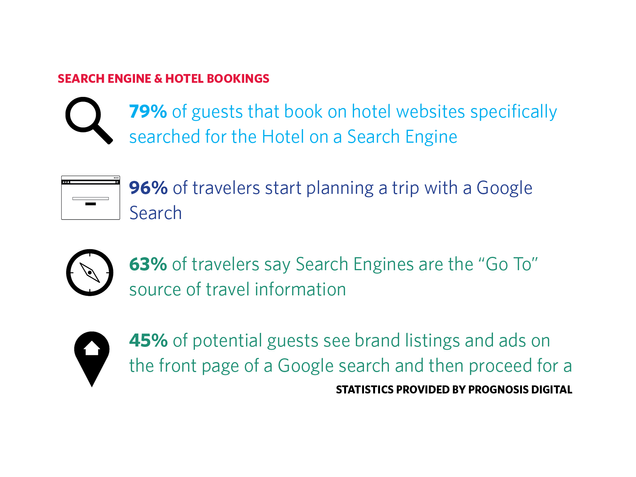Search Engine Marketing (SEM): Financial & Competitive Advantages of an Effective Hotel SEM Strategy
By: Leora Halpern Lanz & Jovanna Fazzini
Inefficient algorithms drove various search engines throughout the 1990’s. Search results were at times unrelated to the proposed query, and were cluttered with spam. Google soon devised a more organized and systematic search result listing, and the relevance of search results improved exponentially. The plethora of data distributed on the web also inspired the emergence of an online industry to sell and exchange goods and services between web users.
By 2000, with Google implementing its advertising models, pay per click emerged, and companies began to implement SEM strategies. SEM, including paid-search advertising and search engine optimization, revolutionized online marketing.
The Essentials
Search Engine Marketing (SEM) is a rapidly evolving strategy used by myriad industries worldwide. The hospitality industry, and hotels particularly, must adapt brand websites, promotional positioning tactics, and online distribution channel strategies to meet and exceed ever-evolving consumer demands and expectations. It is imperative to remodel SEM tactics, and implement new strategies to remain competitive on a truly dynamic playing field that is the hospitality industry.
In todays ‘internet economy’, online purchases of hotel rooms and hospitality services increasingly dominate the market. SEM is now a necessary element of the hotel marketing mix.
Paid Search and Search Engine Optimization
The first component of successful SEM implementation is paid search, which typically occurs through a search engine such as Google, and takes place on what is essentially an auction market. The hotel bids on the Pay-Per-Click (PPC) cost which it is willing to incur for the specific key words consumers use to conduct a web search. Google has made available specific SEM opportunities for hotels with its Hotel Ads program.
 The financial benefits of paid search are significant. According to a study conducted by Prognosis Digital, a hospitality-focused digital marketing firm based in India, global hotel brands with the objective of increasing the number of online bookings and targeting international tourists and business travelers invested in a PPC campaign and saw results within 10 months. The PPC campaign increased web traffic, increased conversion rates, and counteracted tough competition from local players who had established strong presence for related key words. On average, these hotels increased the number of bookings by over 300 bookings per hotel, and decreased the cost per click incurred by 250%.
The financial benefits of paid search are significant. According to a study conducted by Prognosis Digital, a hospitality-focused digital marketing firm based in India, global hotel brands with the objective of increasing the number of online bookings and targeting international tourists and business travelers invested in a PPC campaign and saw results within 10 months. The PPC campaign increased web traffic, increased conversion rates, and counteracted tough competition from local players who had established strong presence for related key words. On average, these hotels increased the number of bookings by over 300 bookings per hotel, and decreased the cost per click incurred by 250%.
Paid search is effective, results are immediately visible, and efforts are easily measured. Paid search extends to banner space on other websites including online travel agency (OTA) websites. It can be shut on and off whenever deemed necessary. For example, Marje Bennetts, General Manager of the Beach House Hotel Hermosa Beach, California, a luxury 96-suite boutique hotel, depicted the importance of paid search for smaller independent hotel promotions.
“Our hotel ran promotional packages in January and February (2015) including a discount package and a romance package for Valentines Day…and the paid placement on trip advisor led the program to fill,” says Bennetts. “We were able to immediately shut off the paid-search promotion as soon as this occurred,” and Bennetts received “feedback on how each reservation was booked, what guests were paying, and where every reservation came from.”
Although paid search is an advantageous strategy, nearly every hotel has this opportunity. The ability to bid for the ideal ‘key word’ and pay for a ‘click’ is largely dependent on the size of a hotel’s marketing budget. The Cost-Per-Click (CPC) can be as expensive as $6 per-click if not more – costs which quickly accumulate particularly for smaller, independent hotels. Bidding for large numbers and varying combinations of words can bring the average CPC down to manageable levels, however, hotels using solely paid search are incurring unnecessarily high online marketing costs.
Other aspects of paid search to be wary of include prospective guests’ emotive responses to the word ‘sponsored’. Guests seeking to book hotels online could be skeptic and less trusting of the advertisements paid for by hotels and other businesses.
The second addend in the SEM equation is Search Engine Optimization (SEO), which is completely organic, and essentially free. Hotels and brands do not pay fees to Google or any other search engine. The only fee is to the agency, which manages SEO activity.
SEO requires continuous changes to source code in the hotel website, and linking it with others websites. The challenge inherent in SEO is that’s its efforts may take quite a while – perhaps as long as six to nine months – before resulting in significant online presence.
According to Sachin Suri, managing partner of Prognosis Digital, “Consumer behavior tells us that users have more confidence in organic links, which removes the skepticism some search engine users may experience upon seeing the word ‘sponsored’ above the search result.”
“SEO is also advantageous because as optimization causes online presence to be more profound, the hotel does not need to invest as much of its marketing budget into paid search,” Suri adds.
“The key to successful SEM is finding the balance between paid search and SEO, which proportion of each yields the highest ROI, and converts the most ‘lookers to bookers’.”
Hotels now have the ability to utilize SEM strategies- to position and differentiate their products and services in a continuously expanding online marketplace.
Effective SEM Strategies
Evaluate Internal Strategy & Marketing Goals
Which online distribution channel currently accounts for most booking revenue for your hotel? Are you using an integrative marketing strategy, or relying on one or few channels? What is your current online conversion rate?
It is imperative to pinpoint exactly what your hotel’s marketing goal is. If the goal were a short-term one, for example a package to be promoted in the coming month, paid search would be most effective.
When utilizing paid search, SE, or both, it is necessary to monitor progress and determine when it is appropriate to divest from paid search. Once search results organically appear with SEO, incurring high PPC costs can be avoided.
Conduct External Research
External research involves investigating SEM strategies used by industry leaders. Compare and contrast brand websites and approaches of other hotels within your competitive set and beyond. Today, according to Suri, “90% of the hospitality world uses SEM, but most are using it inefficiently.”
Marketing directors should be attentive to budget allocations for paid search. An independent hotel is unlikely to have the resources to compete with a larger hotel corporation for a key word. On average “hotels spend 25-35% of their digital budget on paid search” (Milestone Internet). Although it is nearly impossible for a small independent hotel to compete with a large chain hotel in an auction for the highest position on a Google search, it is possible to gain and sustain a competitive advantage through SEO.
Ensure Websites Adapt to the Newer Technological Demands
Regarding responsive website design, the hotel brand website must be visually appealing and easily navigable on all tablet and smartphone screens:
• 68% of travelers recall ads viewed on their smartphones and 59% who viewed on desktop (eMarketers)
• 71% of travelers who saw ads on a smartphone took action and 63% on desktop (eMarketers)
Hotel websites failing to adapt to the needs of shoppers using smartphones are ignoring the opportunity to fully capture the attention of this market. Budgets should allocate and account for responsive website design.
Identify the SEM Strategy that Reaches Your Target Guest
Position the site exactly where the target guest seeks the service. Gather market intelligence regarding behavioral characteristics and booking tendencies of this target market. Some segments tend to book reservations by calling the hotel directly or through the hotel website. Millennials, on the other hand, make more purchases online, and even those choosing to call the hotel have likely conducted online research beforehand.
A newer SEM technique, Gmail Sponsored Promotions (GSPs), targets online users via email advertisements rather than web searches. This is not to be confused with direct email marketing. Rather, GSP is a paid search technique by which online email account providers place advertisements within the email account itself. According to Suri, “GSP is cheaper than other paid search tactics because it is very new and businesses are either unaware of it or using it inefficiently.” Bidding with other companies for key words may place your brand’s website on the first page of search results, yet GSP places your banner and/or link directly into a target consumers email account. Segmenting and differentiating opportunities are endless.
Monitor SEM Strategies to Determine the Channels Yielding the Highest ROIs
The effectiveness of SEM lies in its flexibility and measurability. It is easy to pinpoint SEM ROI. SEM places control of the budget in the hands of the company, as the budget can be revised at any time. If in one week the decision is made to budget $100 on key words, this budget can be implemented; the key words can later be relinquished when the short-term marketing goal is reached.
When managing different marketing channels and measuring the profitability of each, paid search and SEO have proven effective in yielding high ROI’s, particularly as these offset a hotel’s dependency on third party intermediaries (TPI).
Previously, TPIs were the primary channels assisting hotels in increasing sales and occupancies, but now they are becoming more costly. Online travel agency (OTA) commissions can be as high as 35%. Hotel managers and marketing departments can choose to invest less in OTAs and more in SEM, thereby reducing OTA commissions and costs.
While hotels of various sizes and target markets use SEM, there is currently no distinct method determining the appropriate percentages of paid search and SEO to be used in digital marketing strategy. The objective is to find the balance between paid search, SEO, and other digital marketing intermediaries. Once obtained, this will allow a hotel of any size to gain and sustain a competitive advantage through its online presence.
 Jovanna Fazzini is a student at Boston University’s School of Hospitality Administration (SHA). Her studies and areas of interest include finance, accounting, and revenue management for the hospitality industry. Jovanna is currently working with LHL Communications and as a Pricing and Competition Analyst at Road Scholar, an educational travel provider headquartered in Boston. Beyond her studies at SHA, she also is minoring in Business Administration at BU’s Questrom School of Business, and Dance at BU’s College of Fine Arts.
Jovanna Fazzini is a student at Boston University’s School of Hospitality Administration (SHA). Her studies and areas of interest include finance, accounting, and revenue management for the hospitality industry. Jovanna is currently working with LHL Communications and as a Pricing and Competition Analyst at Road Scholar, an educational travel provider headquartered in Boston. Beyond her studies at SHA, she also is minoring in Business Administration at BU’s Questrom School of Business, and Dance at BU’s College of Fine Arts.

